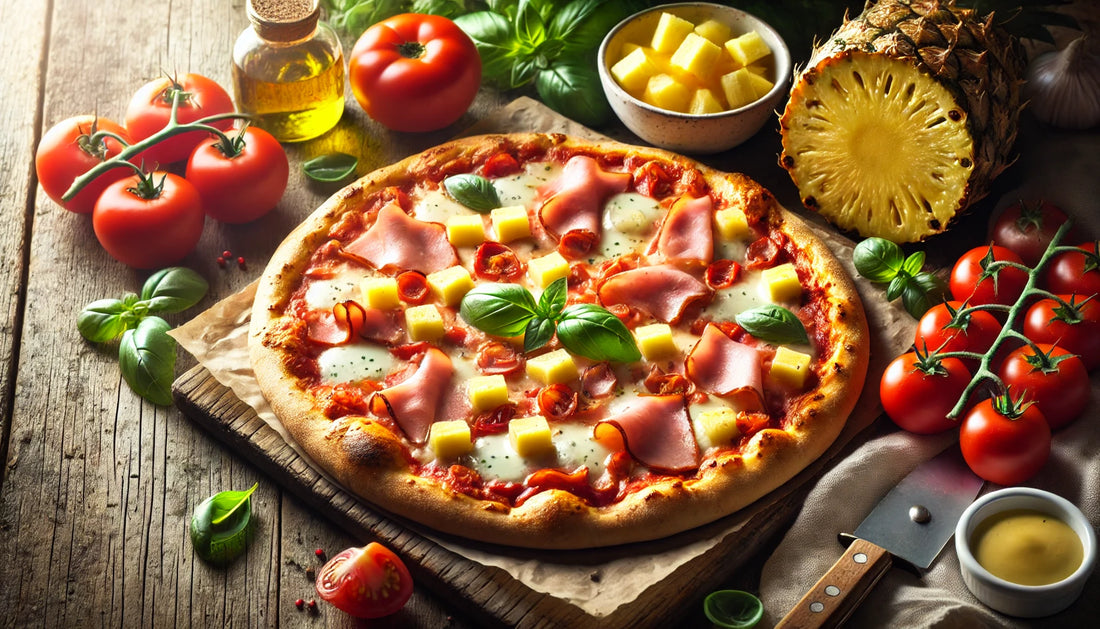
Why AI Thinks Pineapple Belongs on Pizza (or Does It?)
Share
Few topics inspire as much culinary controversy as pineapple on pizza. It’s a debate that pits sweet-and-savory enthusiasts against culinary purists. But what happens when artificial intelligence enters the fray? Can AI, with its objective algorithms and data-driven insights, determine if pineapple is truly pizza-worthy? Or does its neutrality leave the debate as unresolved as ever? Let’s slice into the question and see how AI approaches this surprisingly contentious topic.
The AI Perspective: Data Over Taste
Artificial intelligence doesn’t have taste buds. It doesn’t savor the tangy burst of pineapple juice or recoil from its sweetness on melted mozzarella. Instead, AI relies on numbers, patterns, and data to "form opinions" on subjective matters like this. By analyzing millions of data points—ranging from pizza orders worldwide to social media trends—AI can identify patterns that shape its perspective on pineapple pizza.
Global Popularity and Trends
AI systems like those used in market research can track how popular pineapple pizza is around the globe. For example:
- Canada claims to be the birthplace of the Hawaiian pizza, with the combination of ham and pineapple originating in Ontario in 1962.
- In Australia, Hawaiian pizza is a national favorite, often ranking among the top-ordered flavors.
- Conversely, in Italy, the home of traditional pizza, pineapple is often viewed as heretical.
AI observes these regional divides and might conclude that opinions on pineapple are largely cultural and subjective.
Social Media Sentiment Analysis
AI can also comb through social media platforms to gauge public sentiment. Posts like “Pineapple on pizza is the best!” or “Why would anyone ruin pizza with pineapple?” offer insights into how people feel. Sentiment analysis tools use natural language processing (NLP) to determine the tone and polarity of these discussions. Overwhelmingly, the data reveals a split audience: a large contingent of vocal supporters and equally passionate detractors.
Why Does AI Care About Pineapple on Pizza?
You might wonder why AI would even bother analyzing such a seemingly trivial topic. The truth is, debates like these are fascinating testing grounds for AI decision-making and recommendation systems. Let’s dive into a few reasons why AI might engage with this question:
1. Understanding Preferences
When AI powers food delivery apps or restaurant recommendation engines, it needs to understand what people want. The pineapple debate provides a prime example of polarized preferences. By analyzing user reviews and order histories, AI can fine-tune its recommendations to cater to personal tastes.
2. Cultural Sensitivity in AI
To serve diverse users, AI must recognize and respect cultural differences. In food, as in other areas, AI systems can learn that what’s popular in one region may be unpopular elsewhere. This adaptability ensures that AI provides relevant suggestions without imposing its "opinions."
3. Improving Human-AI Interaction
Debates like these allow AI to better understand human emotions, humor, and subjectivity. If an AI assistant can jokingly weigh in on pineapple pizza or recognize the controversy with a cheeky remark, it builds rapport with users and makes technology feel more relatable.
The Science of Sweet and Savory
From a culinary standpoint, pineapple’s sweet-and-savory profile has its defenders. Advocates argue that the acidity of pineapple cuts through the richness of cheese and complements the saltiness of ham. But detractors say fruit belongs in dessert, not on pizza. How does AI navigate this culinary clash?
Machine Learning Meets Flavor Profiles
AI models trained on flavor pairings use databases like the "Food Pairing Database" to predict which ingredients complement each other. Pineapple scores surprisingly well with pizza components:
- Tomato sauce: The acidity of tomatoes and pineapple can harmonize well.
- Cheese: The creamy saltiness of mozzarella provides a neutral base for sweetness.
- Ham or bacon: The umami of cured meats contrasts with pineapple’s natural sugars.
Using this information, AI might conclude that pineapple has a scientific basis for belonging on pizza—at least for those who enjoy bold flavor combinations.
Can AI Solve the Debate?
AI excels at aggregating data and providing insights, but subjective questions like “Does pineapple belong on pizza?” are inherently human. The beauty of this debate lies in its unanswerability. AI can offer perspectives, but it can’t replicate the deeply personal experience of eating pizza.
The Algorithm’s Conclusion
If AI were to issue a verdict, it might sound something like this:
- For the pineapple lovers: “Data shows that pineapple pairs well with common pizza ingredients and is popular in many regions. Go ahead and enjoy your tropical slice!”
- For the skeptics: “Traditional pizza purists have valid points, and personal taste varies. Stick to what you love!”
In short, AI would likely conclude that both camps are right in their own way. This response highlights AI’s ability to remain impartial and cater to individual preferences.
What AI Teaches Us About Human Debates
The pineapple-on-pizza debate isn’t just about food—it’s a microcosm of how humans navigate differences. AI’s role in such debates underscores a few key lessons:
- Data Isn’t Everything: Numbers can inform decisions, but they can’t capture the emotional nuances of personal taste.
- Diversity Matters: AI shows us that cultural context shapes opinions. What’s considered “normal” in one place might be “weird” elsewhere—and that’s okay.
- Embrace Subjectivity: Some questions don’t have right or wrong answers. The joy of food lies in its ability to spark conversations and bring people together (or divide them playfully).
Final Slice: What’s Your Verdict?
As the pineapple pizza debate continues to rage, AI reminds us that taste is personal. Whether you’re team pineapple or team “keep fruit off my pizza,” the real winner is the conversation itself. After all, few topics have the power to inspire such passionate discourse over a slice of pizza.
So, next time you order a pizza, consider consulting an AI assistant. It might not have taste buds, but it has plenty of data—and maybe even a sense of humor. Who knows? It might just predict your next favorite topping.


